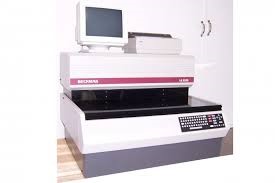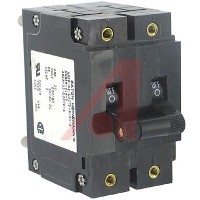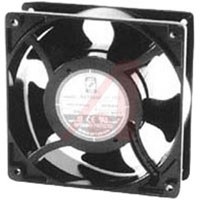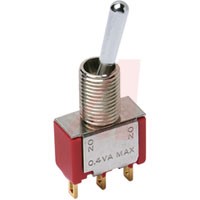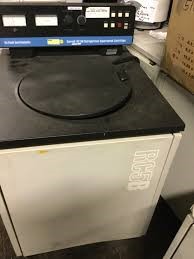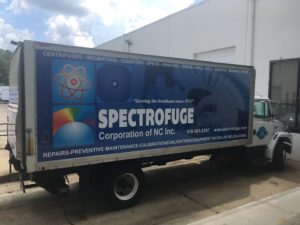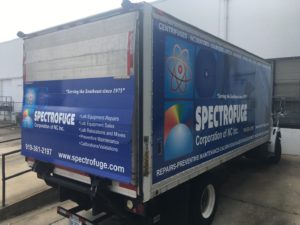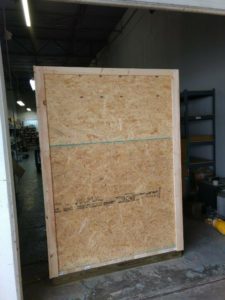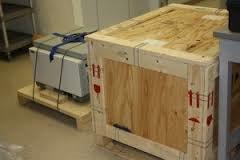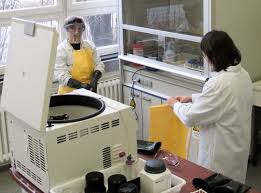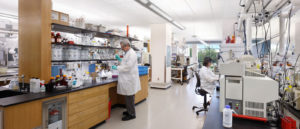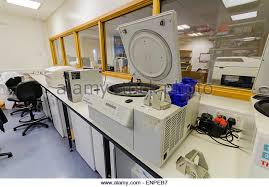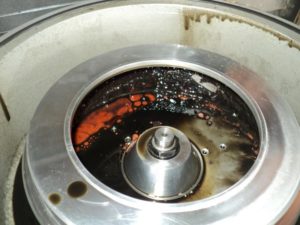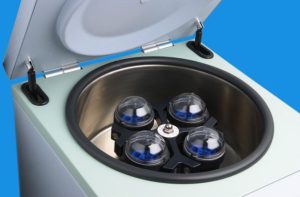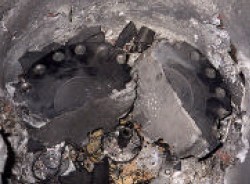Add your feed to SetSticker.com! Promote your sites and attract more customers. It costs only 100 EUROS per YEAR.
Pleasant surprises on every page! Discover new articles, displayed randomly throughout the site. Interesting content, always a click away
Spectrofuge
spectrofugeFire, Smoke and/or Water Damage in a Research Laboratory 30 Mar 2023, 8:02 pm
Damage from fire, smoke, and water can cause critical damage to sensitive laboratory equipment. As a well-respected laboratory equipment service company in our service areas, Spectrofuge can provide knowledgeable and efficient inspections of your affected laboratory equipment. Spectrofuge will work closely with your research and administrative personnel to provide comprehensive assessments of potential damage to your equipment. Our service specialists can provide thorough cleaning and inspection of your sensitive laboratory equipment to restore the equipment to proper operational condition with minimal downtime. Please call 919-361-2197 to speak to one of our experienced service specialists about your equipment.
The post Fire, Smoke and/or Water Damage in a Research Laboratory appeared first on Spectrofuge.
Extending the Life of “Obsolete” Laboratory Equipment 13 Sep 2017, 3:52 pm
“That centrifuge is obsolete.” “We no longer support that model spectrophotometer.” “Parts for your laboratory shaker are no longer available.” “The part you need for your scintillation counter has been discontinued and there is not a replacement.” In the laboratory equipment service world, these statements are very common, and seem to occur more and more frequently. In fact, you may have been told this about a centrifuge or an incubator that you purchased just 10 years ago or less. As technology changes, advances in R&D are discovered and instrumentation design is improved, and the equipment manufacturers phase out instrumentation faster and faster to make room for sales of the newer models.
If you talk to the actual laboratory equipment users, however, and get their feedback, you will find that they like their “older” laboratory equipment. The laboratory equipment users understand the operations of the equipment, they have all the necessary rotors for the centrifuges, the lab protocols are set up for running assays on the “old” scintillation counter, the “old” laboratory shaker is a workhorse and can run for days, and the lab does not have to allocate precious research dollars for new equipment.
Liquid Scintillation Counter
Spectrofuge Corporation of NC, Inc. prides itself in its commitment and ability to maintain older laboratory equipment that has reached its end of life with the manufacturer. Spectrofuge has been dedicated to this commitment for over 40 years. We have found several ways over the years to maintain this commitment.
Spectrofuge technicians have put in hours of research, phone calls, and testing in order to identify the original parts used in many pieces of laboratory equipment. Circuit breakers, lamps, motor brushes, fans, and electronic parts are used in all types of laboratory research equipment, but the manufacturer of the equipment does not make those replacement parts. Spectrofuge technicians have been able to troubleshoot specific instrument operational problems down to these component levels. Then,the technicians have been able to source the original parts to the original suppliers, saving the customer money, as well as prolonging the life of the instrument which has been “obsoleted” by the OEM.
Common Parts Used in Laboratory Research Equipment
Spectrofuge also purchases previously owned laboratory equipment from equipment auctions, laboratory equipment resellers, surplus warehouses, labs that are going out of business, and other equipment sources. Spectrofuge has found that we can extend the life of many types of laboratory equipment with parts from these previously owned units. We also offer our customers the option of purchasing previously owned laboratory equipment that we have carefully refurbished and restored. For example, a customer has a floor model refrigerated centrifuge that is beyond economical repair. Spectrofuge can offer them the same model or compatible model centrifuge at a major savings to the customer, saving them from purchasing a new centrifuge for $50k to $60K. Plus, the customer can use their same rotors, which also saves them money.
Refrigerated Floor Model Centrifuge
If you have questions about your older laboratory research equipment and would like to discuss options for repairing and maintaining that equipment, Spectrofuge technicians would be glad to speak with you about the options. With over 41 years in the laboratory equipment service industry, Spectrofuge can assist you with making informed and smart decisions about your equipment needs so that you can focus on the most important task at hand, your research.
The post Extending the Life of “Obsolete” Laboratory Equipment appeared first on Spectrofuge.
What Are Spectrofuge’s Service Rates and How Are These Rates Established? 20 Jul 2017, 2:54 pm
Spectrofuge takes great pride in making sure that our labor rates are competitive, reasonable, yet not exorbitant. Skilled technicians with the expertise needed to properly assess malfunctions in laboratory research equipment and perform necessary repairs are vital to our business. Laboratory research equipment have a wide variety of operational systems, that include mechanical parts, drive motors, electronic circuit boards, temperature regulating systems, digital and analytical components, internal computers with instrument specific software, radioactive sources, vacuum pumps, robotic arms, bearing assemblies, as well as other components. Spectrofuge technicians are cross-trained in as many types of equipment as possible, with several technicians that are more skilled in some areas than others. Spectrofuge technicians have over 150 years combined of working on laboratory research equipment. Several of our technicians have been with Spectrofuge for over 20 years. Spectrofuge also offers its customers a source for repairs of older equipment, equipment that is not supported by the original manufacturer, and obsolete equipment. Spectrofuge technicians have years of repair history with many older models of laboratory equipment and the problems those models experience. Our technicians have available to them surplus parts and equipment for troubleshooting and repairing the old equipment. Our hourly rates take into account all these variables as well as the labor rates of our competitors
For all Spectrofuge service calls, we charge an up-front fee, which is referred to as an on-site charge. This is a one-time fee that is charged to all of our customers who request a service call on a piece of laboratory equipment. Our customers routinely have questions about what this on-site charge covers and includes. The on-site fee covers expenses that the customer does not necessarily see but that do exist. The on-site fee covers expenses like travel costs for our technicians, including fuel and vehicle upkeep, costs of maintaining a competent central business office with knowledgeable and experienced staff that support all aspects of a service business, maintaining up-to-date manuals and service literature for laboratory equipment we service, costs of proper testing equipment and tools for the service technicians, as well as other costs. Our customers from time to time will ask us if an on-site charge can be waived if we are in the building or split with another customer in the same building. To be fair to all of our customers, it is not possible to choose which customers should or should not receive the on-site charge. Spectrofuge strives to be transparent in explaining all of its rates and realizes that customers will have questions.
Spectrofuge’s labor rates reflect all the knowledge, cross-training, historical information, and years of experience outlined in the information stated above. Laboratory research equipment is expensive to purchase and it is expensive to repair and maintain. Spectrofuge technicians are committed to giving you the best possible service for your money and we stand by our repairs. Since 1975, customer satisfaction has been key to our successful business and is our goal every time one of our technicians walk into your research lab.
The post What Are Spectrofuge’s Service Rates and How Are These Rates Established? appeared first on Spectrofuge.
Spectrofuge: Your Turnkey Professional For Your Sensitive Lab Equipment Relocation 15 Jun 2017, 2:11 pm
Moving a scientific research lab can be a daunting experience for a lab manager and all the lab personnel. From small equipment like roller drums to spectrophotometers to complete HPLC systems, labs must consider many issues when planning their lab move. In our experience, labs will secure the services of general movers for all their laboratory equipment from the smaller items to the larger, more sensitive pieces of equipment. These general movers may have years of commercial moving experience for equipment like printers, computers, monitors, and in many cases, laboratory research equipment. Spectrofuge is sure that these general movers can move the less critical and less sensitive equipment. In our experience, general movers have limited experience with the operations of the more sensitive laboratory research equipment like HPLC/FPLC systems, robotic imaging systems, centrifuges, and liquid scintillation counters. Spectrofuge does not advise that these general movers relocate your sensitive laboratory equipment. Improper preparation, transportation, and reinstallation of sensitive laboratory equipment can lead to damage to the equipment, expensive repairs, costly downtime of the equipment, and time-consuming insurance claims. 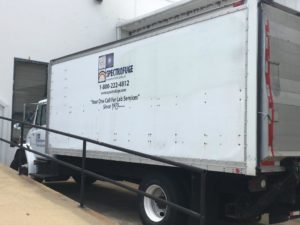

Spectrofuge Moving Truck
Spectrofuge, as an independent service provider, has been in the laboratory service business since 1975. Our service technicians have over 150 years combined experience in servicing laboratory equipment. Spectrofuge technicians can advise you as to which pieces of lab equipment can be moved by general movers and which need to be moved by our experienced team of service technicians. Our technicians know what can go wrong when sensitive lab equipment is not moved properly and carefully. Spectrofuge knows that a smooth relocation of the equipment from the old facility to the new is vital to keeping your research on track. When Spectrofuge technicians move your sensitive lab equipment you receive a full “turnkey” move experience. Spectrofuge can address all your concerns pertaining to moving your sensitive laboratory equipment: proper preparation, reliable and safe transportation, and in most cases, reinstallation of your lab equipment on the same day to provide an effortless transfer to your new facility. Through our experience we have learned the best questions to ask when planning a move, such as: “What are the expected dates of the move? Will there be adequate loading dock space? What is the estimate of the total value of equipment that is being moved?” Determining the answers to these questions prior to a move increases the smoothness of the transfer and prevents potential problems from arising at the time of the move. Spectrofuge has invested in the proper trucks, packaging materials, hydraulic lift carts, other moving equipment, and additional necessary resources to provide you with a safe and seamless moving experience. We will also secure the necessary liability and transit insurance to cover the value of your sensitive lab equipment. As a service provider for laboratory equipment for over 40 years, Spectrofuge is your “turnkey” professional for your sensitive laboratory equipment relocations. Please contact us at 919-361-2197 or at info@spectrofuge.com with questions about your upcoming laboratory relocation.
Spectrofuge Packaging of Sensitive Laboratory Equipment
Spectrofuge Customer Testimonial
“Wake Forest has relied on Spectrofuge for many of our service and repair needs for years, and they have always done great work and cared for our equipment well. So, when it was time to move 15 labs across town we knew they were the ones to call! As expected, they did a great job with all our instruments, from spectrophotometers and HPLCs to mass spectrometers.”
Dr. Rebecca Alexander
Professor of Chemistry
F.M. Kirby Family Faculty Fellow
Wake Forest University
The post Spectrofuge: Your Turnkey Professional For Your Sensitive Lab Equipment Relocation appeared first on Spectrofuge.
Should My Lab Purchase a Service Contract for our Lab Equipment? 16 May 2017, 4:30 pm
What Should I Consider When Thinking About Getting a Service Contract?
There are several factors you should consider when contemplating whether or not you want to buy a service contract for your laboratory equipment. One of the most important factors to think about is how important the piece of equipment is to the function of your lab. You should consider what would happen to your lab’s productivity if this piece of equipment were to break down. Do you have equipment that can be used while the other is out of service? Will you able to wait weeks for the piece of equipment to be repaired? If the answer to either of these questions is “no”, then you should seriously consider purchasing a service contract for your equipment. A service contract will ensure that you can have your equipment repaired in a timely manner so that you can continue your research.
Another important factor to consider when thinking about getting a service contract is cost. Service contracts typically include preventive maintenance programs that ensure productivity and decrease the chances of equipment failure. Having equipment that meets regulation compliances and is consistently working properly prevents any chance of lost revenue due to an inability to conduct your research. These service contracts that provide preventive maintenance also extend the life of laboratory equipment, which means you will be able to go for a longer period of time without having to buy new, expensive equipment.
Researchers working in their labs using their laboratory equipment
What Are the Different Kinds of Service Contracts Available?
A company that offers service contracts will typically have two to three different options, from a basic plan to a more advanced option. A basic service contract will usually consist of an on-site visit by a technician or a preventive maintenance. More advanced contracts frequently include multiple on-site visits for repairs as well as preventive maintenance once or twice a year. Some service contracts include the costs for both labor and parts, while some contracts will only cover the cost of the labor. If you are considering what kind of service contract to purchase for a vital piece of equipment you should seriously look at getting an advanced, full-service contract that covers repairs and maintenance. This will ensure that you get your equipment back up and running in a timely manner so you can continue your research and productivity. These advanced contracts will also provide you with greater cost savings because they will cover the cost of labor and parts, which can save you 30%-50% in repairing your lab equipment. Most research organizations have service contracts in place for key pieces of equipment because the benefits of efficient and quick repair, and preventive maintenance outweigh any potential costs.
Service contracts vary with their terms and conditions, and what services are excluded. Please contact Spectrofuge for more information if you are interested in having a service contract with us.
Research Equipment in a Laboratory
The post Should My Lab Purchase a Service Contract for our Lab Equipment? appeared first on Spectrofuge.
Centrifuge Care and Maintenance in the Lab 22 Mar 2017, 4:26 pm
How Is a Centrifuge Used?
Centrifuges are used to increase the sedimentation rate of particles by using centrifugal forces, which are forces that are greater than gravity. Centrifuges consist of several parts including a rotor, motor, imbalance detector, tachometer, safety lid, and braking system. Some centrifuges also include a refrigeration system. They are classified into three categories: low-speed, high-speed, and ultra-speed. Low-speed centrifuges are used to separate serum or plasma from red blood cells, and to harvest and purify various precipitates and cell fragments. High-speed centrifuges are used to separate cell constituents. They are also used to isolate and purify viruses. Ultracentrifuges are mainly used to isolate and purify membrane components.
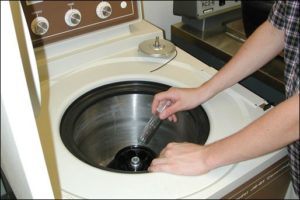 A Researcher Using a Centrifuge
A Researcher Using a Centrifuge
How Can a Centrifuge Be Damaged?
Improper centrifuge care can lead to damage of critical centrifuge parts, resulting in the malfunction of the centrifuge. Aggressive chemicals can lead to corrosive spots on the rotors and rotor-buckets, which can in turn lead to holes forming in the rotor. Improper cleaning can also damage coatings and lead to corrosion. Sensors, gaskets, seals, and wiring can become damaged if flood with water.
What Should I Do to Keep My Centrifuge Working Properly?
There are several important cleaning and safety procedures that should be used to ensure a centrifuge works properly. First, you should clean your centrifuge daily. This includes cleaning both the exterior and the interior of the centrifuge. A sponge, warm water, and a mild detergent can be used to clean the centrifuge. Do not use caustic detergents or a product that contains chlorine ions. A plastic scrub brush should be used to avoid damaging the coatings. When you are finished cleaning the centrifuge you should use a centrifuge lubricant to lubricate the bucket grooves and rubber seals. You should also use approved disinfectants and/or “spill” kits to disinfect the centrifuge on a regular basis. In addition to cleaning the centrifuge, you should also check for residue and corrosion on the rotors on a weekly or monthly basis.
Why Should I Schedule Regular Preventive Maintenance For My Centrifuge?
Scheduling regular preventive maintenance with a trained technician for your centrifuge is vital because it increases the durability and functionality of the centrifuge. Regular preventive maintenance also ensures accurate results and reliable performance, which will benefit your research. Regular preventive maintenance includes the inspection of the physical condition, inspection of the electrical condition, cleaning, and testing of the centrifuge. Regular preventive maintenance will not only prevent damage, but can also identify damage that has already occurred and repair it before the centrifuge is no longer usable. In order for your centrifuge to be in the best possible condition and to ensure the reliability of your research you should regularly schedule preventive maintenance with a trained technician.
The post Centrifuge Care and Maintenance in the Lab appeared first on Spectrofuge.
Rotor Care and Safety 10 Feb 2017, 4:18 pm
What Is a Rotor? How Is It Used?
Manufacturers of laboratory centrifuges such as Sorvall, Beckman, and Eppendorf also manufacture rotors for their centrifuges. In laboratory centrifuges, the rotor acts as a rapidly rotating container, spinning at very high rates of speed. Centrifugal force is created during these spins, acting on the rotor and its contents to achieve various research purposes. There are three type of rotors: swinging-bucket rotors, fixed-angle rotors, and vertical rotors. Swinging-bucket and fixed-angle rotors are most often used in benchtop, low-speed, and high-speed floor-model centrifuges. Vertical rotors are frequently used in ultracentrifuges. Swinging-bucket rotors are used to separate large-volume samples at low speeds, while fixed-angle rotors are used for basic pelleting differential separations. Vertical rotors are typically used for isopycnic separations, such as the banding of DNA in cesium chloride.
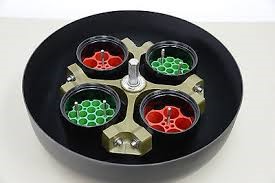 Centrifuge Rotor
Centrifuge Rotor
How Can a Rotor Be Damaged?
The rotor in a centrifuge can be damaged in several ways if it is not maintained properly. Some of the most common causes of rotor damage are improper handling, stress corrosion, missing paint and anodization, dropping the rotor, overheating, and running the rotor overspeed. Once a rotor is slightly damaged the centrifugal forces that are created during a run can exacerbate the problems. Therefore, over a period of time, even the smallest of flaws in a rotor can lead to more disastrous events such as a centrifuge mishap with a destroyed rotor and a destroyed centrifuge.
How Can Rotor Damage Be Prevented?
Rotor damage can be prevented if you follow several basic rotor care guidelines. One of the most important things you can do to prevent rotor damage is to rinse the rotor with water or a solution suggested by the manufacturer after each use to remove any residual samples or debris. You may also use a mild soap with a soft brush. After rinsing the rotor you should always let it thoroughly dry before using it again. If you work with infectious agents you should also disinfect the rotor after each use. When working with infectious agents you should also sterilize the rotor using autoclaving or UV exposure to kill the infectious agents.
There are several smaller parts within the rotor that also need to be cared for such as O-rings, lid threads, and locking mechanisms. O-rings should be dried and relubricated every time you wash or disinfect the rotor. To prevent lid threads from becoming damaged you should clean the threads with a soft, lint-free cloth. This helps prevent the buildup of debris, as well as ensures that the locking mechanisms will not be damaged.
Should I Regularly Schedule a Rotor Inspection?
Regularly conducting rotor inspections by a trained technician is an important part of preventing damage to the rotor and increasing the rotor’s life span. As a rotor is used over time it will begin to show signs of damage. This is when an inspection becomes necessary to prevent further damage to the rotor. During an inspection the technician will be able to determine the best way to prevent further damage to the rotor if there is any, as well as prevent damage from occurring by examining the rotor for any signs of stress corrosion, metal fatigue, and wear or damage to the anodized coatings. A technician will also be able to tell you if the rotor is safe for continued use, should be further repaired, or if it should be replaced. With careful care and regularly scheduled inspection, the rotor of a centrifuge can last for several years, allowing you to perform your work with ease.
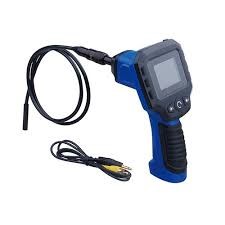 Camera Used for Rotor Inspections
Camera Used for Rotor Inspections
The post Rotor Care and Safety appeared first on Spectrofuge.
Obstacles Faced by Third Party Service Companies 25 Jan 2017, 3:25 pm
When Larry Autry, founder of Spectrofuge Corporation of NC, Inc. made the decision to start a third party laboratory equipment service company in 1975 he knew there would be obstacles to face. As a small business competing with large manufacturers of centrifuges and other types of laboratory equipment, Spectrofuge had to find ways to obtain parts, service literature, service manuals, and technical support. This is not as simple as just setting up an account with the manufacturers. The equipment manufacturers were not very helpful with providing information to a third party service company that was going to be competing for their business.
Other industries have faced these obstacles with major manufacturers, specifically the auto repair industry. The “Motor Vehicle Owners’ Right to Repair Act”, sometimes referred to as “Right to Repair”, is a name for several related bill proposals in the United States Congress and some state legislatures that would require automobile manufacturers to provide the same information to independent repair shops as they do for dealer shops. Car manufacturers have resisted supplying parts, updates, and service information to independent auto service companies as a way to discourage their business operations.
The goal of the legislation as it was first introduced in 2001 was to end the unfair advantage of car manufacturers maintaining control over repair information that could result in independent companies turning away business due to lack of information. Various versions of these bills exist today, but they have also faced opposition.
These are the same type of obstacles faced by independent laboratory equipment service companies. Fair competition between equipment manufacturers and independent laboratory equipment service companies is impeded by the control that the manufacturers are trying to maintain over parts and service support.
Spectrofuge has worked very hard to maintain working relationships with various laboratory equipment manufacturers in order to obtain parts and service support. Spectrofuge is also a member of a national organization of independent service companies, the National Independent Service Association (NISA), which allows for the sharing of information. It also enables independent service companies to build a network of resources to address some of the issues faced by independent service companies. Spectrofuge realizes that fair and equal competition makes for better business practices in order to give the customer the best possible service options at fair prices.
Spectrofuge service specialists have established and maintained strong relationships with customers since 1975, gaining their trust and respect to work on their laboratory equipment. Spectrofuge service specialists realize that the equipment users have other options for servicing their equipment. Our customers deserve knowledgeable service at a reasonable cost in a timely manner.
The post Obstacles Faced by Third Party Service Companies appeared first on Spectrofuge.
